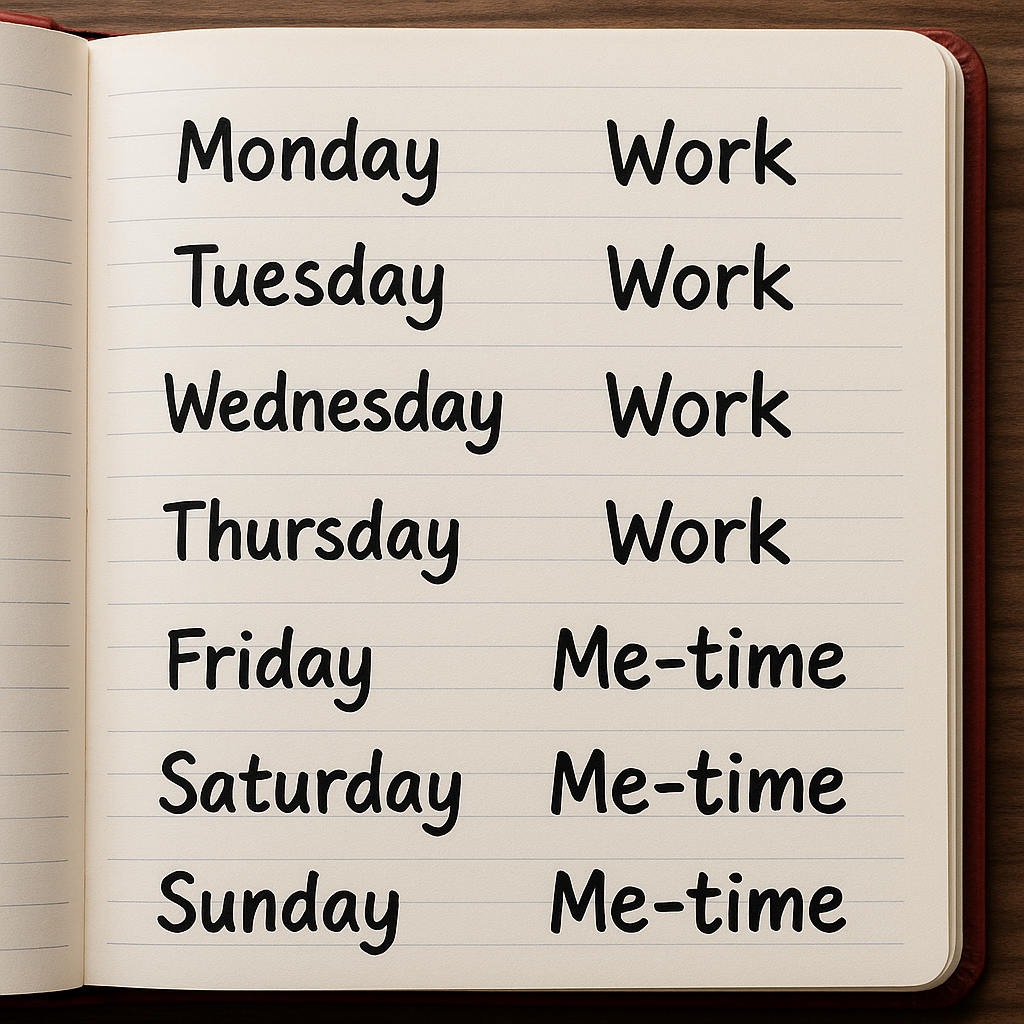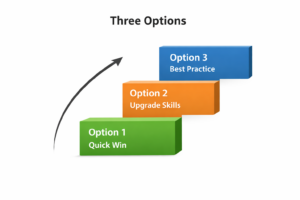I’ve worked a four-day week for the last three and a half years. Most people haven’t even noticed.
No drop in quality. No missed deadlines. No late filings. One of my businesses is in a tightly regulated field. The other deals with engineering equipment sales. Both continue to thrive.
So here’s the obvious question:
If I can do it—why can’t you?
And before you say ‘my industry’s different,’ or ‘our clients expect more,’ let me stop you.
What if those excuses are actually the problem?
Is It Time to Admit That the Five-Day Working Week Is Outdated?
The data is mounting.
Germany recently trialled a four-day working week across 45 companies. Employees were happier. Stress fell. Productivity? It didn’t go down—if anything, it went up.
👉 If the famously efficient Germans can do it, why are we still telling ourselves it’s impossible?
In Iceland, the largest public trial of a shorter working week ran from 2015 to 2019. Today, 86% of the workforce has either moved to reduced hours or gained the legal right to request them.
👉 If it works in Iceland – across public and private sectors – why not in the UK?
Are You Holding Back Your Own Business?
Here’s the uncomfortable truth:
If you’re still clinging to five-day, desk-bound, paper-heavy models – there’s every chance that you are be the bottleneck.
👉 Is it really your clients demanding you stay at your desk five days a week?
👉 Or is it your fear of letting go?
👉 Are you scared that letting people work four days means admitting that Monday to Friday was never necessary?
And be honest—
👉 Are you hiding behind the word ‘consistency’ when what you really mean is ‘resistance to change’?
What Are You Really Committed To – Standards or Stagnation?
Professionals like lawyers, accountants, engineers, insolvency practitioners – we pride ourselves on consistency.
But ask yourself:
👉 When does consistency become inflexibility?
👉 When does “we’ve always done it this way” become an excuse?
The world has moved on.
👉 Are your systems, methods, and mindset keeping pace?
👉 Or are you clinging to Outlook 2010, paper files, wet signatures, and face-to-face-only meetings because they feel familiar?
Here’s the irony:
You say you value excellence, efficiency, and professionalism.
👉 So why are you ignoring the very tools that make you more excellent, efficient, and professional?
Why Are You Ignoring AI and Automation?
Let’s talk about the elephant in the boardroom.
Generative AI, workflow automation, smart data tools – none of these are ‘coming.’ They’re here.
I use AI every day to:
- Draft documents and emails
- Check insolvency law precedents
- Outline case strategies
- Produce structured reports
- Manage marketing content
- And even support others via VAi, our own insolvency co-pilot
That’s how I made the 4-day week work without dropping quality.
I didn’t just cut a day – I upgraded the other four.
So ask yourself:
👉 Have you even tried using AI to support your work?
👉 Have you explored workflow automation to reduce admin?
👉 Or are you so stuck in your comfort zone that you’d rather stay inefficient than risk learning something new?
Are You Letting Generational Blind Spots Hold You Back?
Let’s be honest:
👉 Is the resistance to change really about ‘standards’ and ‘Control’ – or is it about age?
Because Gen Z isn’t having it.
They’re not willing to waste time on outdated systems and bloated hours.
They’ll walk away from firms that measure time over output, tradition over progress, visibility over results.
So ask yourself:
👉 Are you turning off the very talent you need to grow?
👉 Are you scoring an own goal by insisting that ‘we’ve always done it this way’?
What Will You Say to Your Successor?
If you’re planning to exit or sell your business in the next few years, here’s a hard truth:
👉 What is your business worth if it’s seen as rigid, tired, and behind the times?
👉 How attractive is a firm that relies on outdated methods, 5-day culture, and burned-out leaders and burned-out un-engaged staff?
Buyers, successors, and investors want future-facing operations.
They expect automation. They assume AI is already part of the process.
👉 What will you say when they ask, “What’s your AI strategy?”
👉 Can you honestly say your business is ready for the next decade?
What Are You Afraid Of?
Most people resist the 4-day week and automation because of fear.
👉 Are you afraid clients will think you’re slacking?
👉 That staff will abuse flexibility?
👉 That your systems will break under change?
But here’s what actually happens:
- Productivity and accuracy goes up
- Teams become more engaged
- Burnout drops
- Recruitment improves
- Retention stabilises
- And clients? They’re still happy – because they get faster, smarter service
So tell me:
👉 What, exactly, are you still afraid of?
Have You Actually Tried It?
Let’s strip away the theory.
👉 Have you tested a 4-day week with one team?
👉 Have you piloted even one process using AI or automation?
👉 Have you used tools like Power Automate to handle routine workflows?
👉 Have you asked ChatGPT – or VAi – to draft the emails and letters you hate writing?
Or are you still resisting from the sidelines – without ever stepping onto the pitch?
What Happens If You Don’t Change?
Let’s flip the fear.
You’re worried about the risks of change?
👉 What about the risks of standing still?
- Clients are changing.
- Talent expectations are shifting.
- Technology is accelerating.
- Regulatory pressures are rising.
- Margins are tightening.
👉 What makes you think your current model will still work in two to five years?
👉 What’s your plan if younger firms, built from day one around AI, automation, and flexibility, start winning all the work?
👉 Do you really believe you can outwork them the old-fashioned way?
Are You Measuring What Matters?
Ask yourself:
👉 Are you valuing outputs or hours logged?
👉 Are you rewarding results—or presenteeism?
A four-day week forces better habits:
- Streamlined meetings
- Sharper priorities
- Smarter use of tech
- Tighter boundaries
- Happier, healthier teams
So why are we still measuring commitment in hours?
Who’s Really Leading – You or Your Calendar?
Here’s a final question:
👉 Who’s in charge- your business, or your diary?
If you’re stuck in a five-day pattern that no longer serves you, clinging to systems that belong in 2010, ignoring tools that could double your efficiency, then maybe you’re not leading.
You’re surviving.
And that’s no way to build a business – or a life (and doesn’t it go quick?).
Final Thought: If You’re Not Ready to Change, Who Will Be?
We all say we want better work-life balance, stronger businesses, smarter tools.
But unless you’re willing to act, all of that is just talk.
👉 So what’s your next move?
👉 Will you keep clinging to the familiar, or will you try something bold?
👉 Will you take the first step toward real transformation – or wait until your competitors leave you behind?
I’ve made the shift. I’m living it. It works.
Paul Brindley
Oh, and don’t bother trying to get hold of me on Fridays, my bot is looking after my business then.






